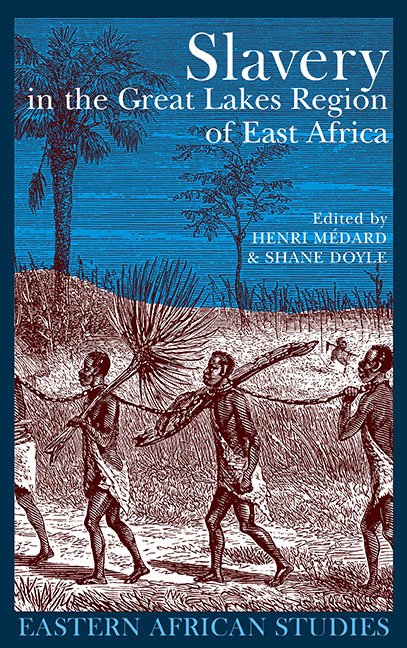Book contents
- Frontmatter
- Dedication
- Contents
- List of Maps & Tables
- Notes on Contributors
- Introduction
- 1 Violence, Marginality, Scorn & Honour: Language evidence of slavery to the eighteenth century
- 2 Notes on the Rise of Slavery & Social Change in Unyamwezi c. 1860 –1900
- 3 Slavery & Forced Labour in the Eastern Congo 1850 –1910
- 4 Legacies of Slavery in North West Uganda: The story of the ‘One-Elevens’
- 5 Human Booty in Buganda: Some observations on the seizure of people in war c.1700 –1890
- 6 Stolen People & Autonomous Chiefs in Nineteenth-Century Buganda: The social consequences of non-free followers
- 7 Women's Experiences of Enslavement & Slavery in Late Nineteenth- & Early Twentieth-Century Uganda
- 8 Slavery & Other Forms of Social Oppression in Ankole 1890 –1940
- 9 The Slave Trade in Burundi & Rwanda at the Beginning of German Colonisation 1890 –1906
- 10 Bunyoro & the Demography of Slavery Debate: Fertility, kinship & assimilation
- References
- Index
Introduction
Published online by Cambridge University Press: 11 August 2017
- Frontmatter
- Dedication
- Contents
- List of Maps & Tables
- Notes on Contributors
- Introduction
- 1 Violence, Marginality, Scorn & Honour: Language evidence of slavery to the eighteenth century
- 2 Notes on the Rise of Slavery & Social Change in Unyamwezi c. 1860 –1900
- 3 Slavery & Forced Labour in the Eastern Congo 1850 –1910
- 4 Legacies of Slavery in North West Uganda: The story of the ‘One-Elevens’
- 5 Human Booty in Buganda: Some observations on the seizure of people in war c.1700 –1890
- 6 Stolen People & Autonomous Chiefs in Nineteenth-Century Buganda: The social consequences of non-free followers
- 7 Women's Experiences of Enslavement & Slavery in Late Nineteenth- & Early Twentieth-Century Uganda
- 8 Slavery & Other Forms of Social Oppression in Ankole 1890 –1940
- 9 The Slave Trade in Burundi & Rwanda at the Beginning of German Colonisation 1890 –1906
- 10 Bunyoro & the Demography of Slavery Debate: Fertility, kinship & assimilation
- References
- Index
Summary
While there is an extensive literature on the history and anthropology of the Great Lakes or interlacustrine region of East Africa (see Map 1), there are few works which focus on slavery. This constitutes a striking contrast with the historiography of the rest of the African continent in which slavery and the slave trade are some of the most prominent themes. Until recently authors working on the Great Lakes region considered that the institution was never a feature of Great Lakes societies or that it existed for only a very short time during the late nineteenth century and even then was of marginal significance, so they did not write about it. In the late 1980s Michael Twaddle re-opened the debate by demonstrating the importance and longevity of slavery in Buganda, but little new work was done in response to this. Indeed, the idea for this book came when Michael Twaddle examined Henri Médard's 2001 dissertation on the nineteenth-century history of Buganda and commented on how little attention had been paid to slavery in it. This led in turn to a conference held in Paris on 16–17 December 2002, hosted by the Centre de Recherches Africaines (University of Paris I/Centre National de la Recherche Scientifique) at which most of the contributors to this book were present.
The starting point of the project, then, was the need to answer very basic questions. Did slavery exist in that region? How old was it? Was the institution marginal or central to these societies? The aim of this book is to demonstrate the diversity of slave institutions across the region and to open up the subject to future and more specific research.
The debate originally concerned Buganda and Bunyoro, two kingdoms in present-day Uganda with intertwined histories. Why enlarge the subject to the Great Lakes region of East Africa? Why not a wider area, say Africa or East Africa? The primary reason is that the Great Lakes region has a distinctive cultural unity.
- Type
- Chapter
- Information
- Slavery in the Great Lakes Region of East Africa , pp. 1 - 37Publisher: Boydell & BrewerPrint publication year: 2007

